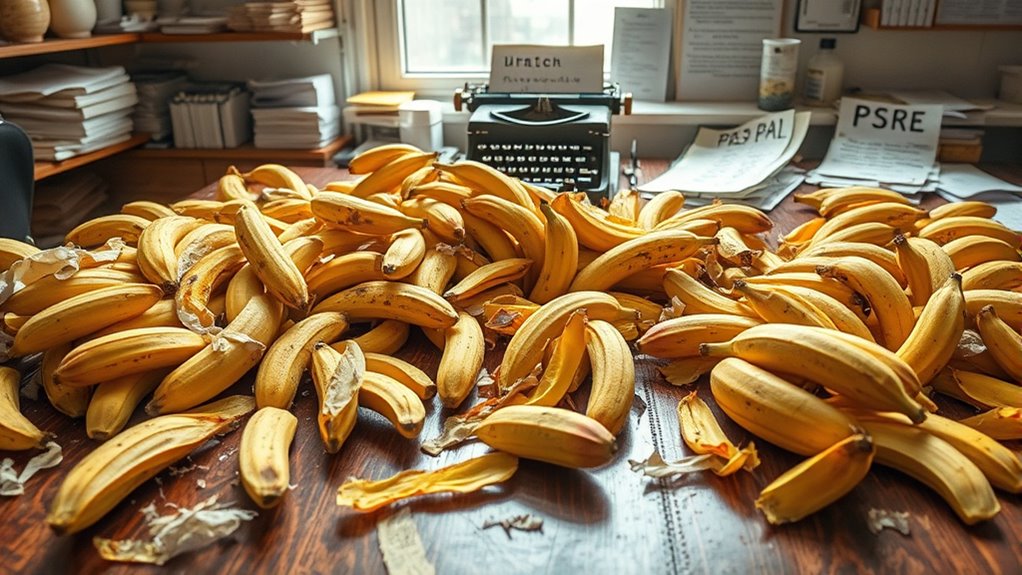The Infinite Monkey Theorem suggests that if you give a monkey infinite time and true randomness, it could type out any text, including Shakespeare’s works. This thought experiment shows how unlikely events can still occur given enough opportunity, especially when randomness is genuine at the quantum level. With infinite time, even the most impossible outcomes become inevitable. Keep exploring to uncover the fascinating ways chance and chaos shape our universe.
Key Takeaways
- The theorem illustrates how infinite time allows random keystrokes to eventually produce any text, including Shakespeare’s works.
- Quantum randomness makes the process more authentic by introducing fundamental unpredictability at the atomic level.
- Over endless trials, improbable events become inevitable, demonstrating probability’s power in an infinite universe.
- The concept highlights the relationship between chaos, randomness, and the emergence of order or recognizable patterns.
- It serves as a metaphor for understanding the universe’s complexity, chance, and the likelihood of all possibilities occurring.

The Infinite Monkey Theorem is a thought experiment that illustrates the idea that, given enough time, a monkey randomly hitting keys on a typewriter could eventually produce any given text, such as the complete works of Shakespeare. It’s a fascinating way to explore probability and randomness, especially when considering how unlikely such an event seems at first glance. But it also opens the door to understanding how randomness works on a fundamental level, particularly through the lens of random letter combinations and quantum randomness.
Imagine a monkey pounding away at a keyboard, each keystroke producing a letter chosen at random. Initially, the strings of characters will be meaningless, a jumble of random letter combinations that bear no resemblance to coherent words or sentences. However, as time progresses, the chances increase that some sequences will start to resemble fragments of meaningful text. The idea is that, eventually, a long enough sequence of random keystrokes might include the entire text of Shakespeare’s plays, though the odds are astronomically small. This concept underscores how probability can be counterintuitive—tiny chances can become almost certain given enough trials.
Over time, random keystrokes can resemble meaningful text, making unlikely outcomes almost certain.
When you think about this process through the lens of quantum randomness, it gets even more intriguing. Unlike classical randomness—like flipping a coin or rolling dice—quantum randomness arises from the fundamental unpredictability of particles at the atomic level. Quantum phenomena produce genuinely random events, such as the decay of a radioactive atom or the polarization of a photon. These events serve as a source of true randomness, unlike pseudorandom algorithms that rely on deterministic processes. If you could harness quantum randomness to generate the keystrokes, the monkey’s random letter combinations would be genuinely unpredictable, adding an extra layer of complexity and authenticity to the thought experiment. Additionally, the irreproducibility of quantum events means that no two sequences would ever be exactly the same, enhancing the unpredictability even further.
While the idea of a monkey producing Shakespeare might seem whimsical, it emphasizes a core principle: with infinite time and truly random processes, unlikely events become inevitable. The role of quantum randomness highlights just how unpredictable the universe can be at its core, even if macroscopic events appear orderly. This thought experiment isn’t just about monkeys and typewriters; it’s about understanding how probability, randomness, and even the fabric of reality itself can produce outcomes that seem impossible—until they happen, given enough opportunity. So, whether you’re pondering random letter combinations or the mysterious nature of quantum randomness, the theorem reveals that in the grand scheme of infinite possibilities, everything that can happen, will happen.
Frequently Asked Questions
Can Monkeys Actually Type Shakespeare’s Works?
You might wonder if monkeys can truly type Shakespeare’s works. In theory, if a monkey randomly hits keys on a keyboard long enough, it could produce any text, including Shakespeare’s plays. This idea relates to random keyboard experiments and ape linguistics, which explore whether primates can communicate complex language. While fascinating, real monkeys lack the intentionality and understanding needed, making it practically impossible for them to produce such intricate literary works.
How Long Would It Take for a Monkey to Produce the Complete Works?
Imagine a playful thought experiment where a monkey produces random letter sequences. If given infinite time, you’d see that, surprisingly, it’s almost certain the monkey would eventually produce Shakespeare’s complete works. While it’s impossible to predict exactly when, over an infinite span, the chances are that all texts, including the Bard’s masterpieces, would appear. So, with endless patience, everything becomes a delightful possibility.
What Are the Real-World Applications of This Theorem?
You might wonder about the real-world applications of the Infinite Monkey Theorem. It helps you understand randomized algorithms that rely on infinite sequences to solve complex problems efficiently. By examining the likelihood of certain outcomes in vast or infinite processes, you can develop better algorithms for data encryption, error correction, and simulations. This theorem provides insight into probability, randomness, and how infinite possibilities can influence practical computing and problem-solving.
Are There Any Experiments Attempting to Test This Idea?
You might wonder if anyone’s actually testing this idea through experiments. Researchers design experiments to explore random chance by simulating large-scale processes, like generating random strings of text or DNA sequences, to see how often specific patterns occur. These experiments help understand probability and randomness in practical ways, providing insights into complex systems and the likelihood of rare events, all rooted in careful experiment design.
How Does Probability Theory Explain the Theorem’s Implications?
Imagine a vast ocean of random chance, where each wave represents infinite possibilities. Probability theory shows that, given infinite time, even the most unlikely events, like a monkey typing Shakespeare, become inevitable. It explains that with unlimited trials, the odds favor the appearance of any specific sequence, no matter how improbable. So, the theorem highlights how, in a universe of endless randomness, anything that can happen will happen.
Conclusion
So, imagine yourself as that endless monkey, tapping away at a typewriter. Each keystroke is a chance, a small ripple in the vast ocean of infinity. Just like the monkey’s random clicks, your efforts can eventually create something meaningful, no matter how unlikely. The theorem reminds us that persistence, like patience, can turn chaos into order. Keep typing, keep dreaming—because amidst the randomness, greatness often waits just beyond the horizon.









